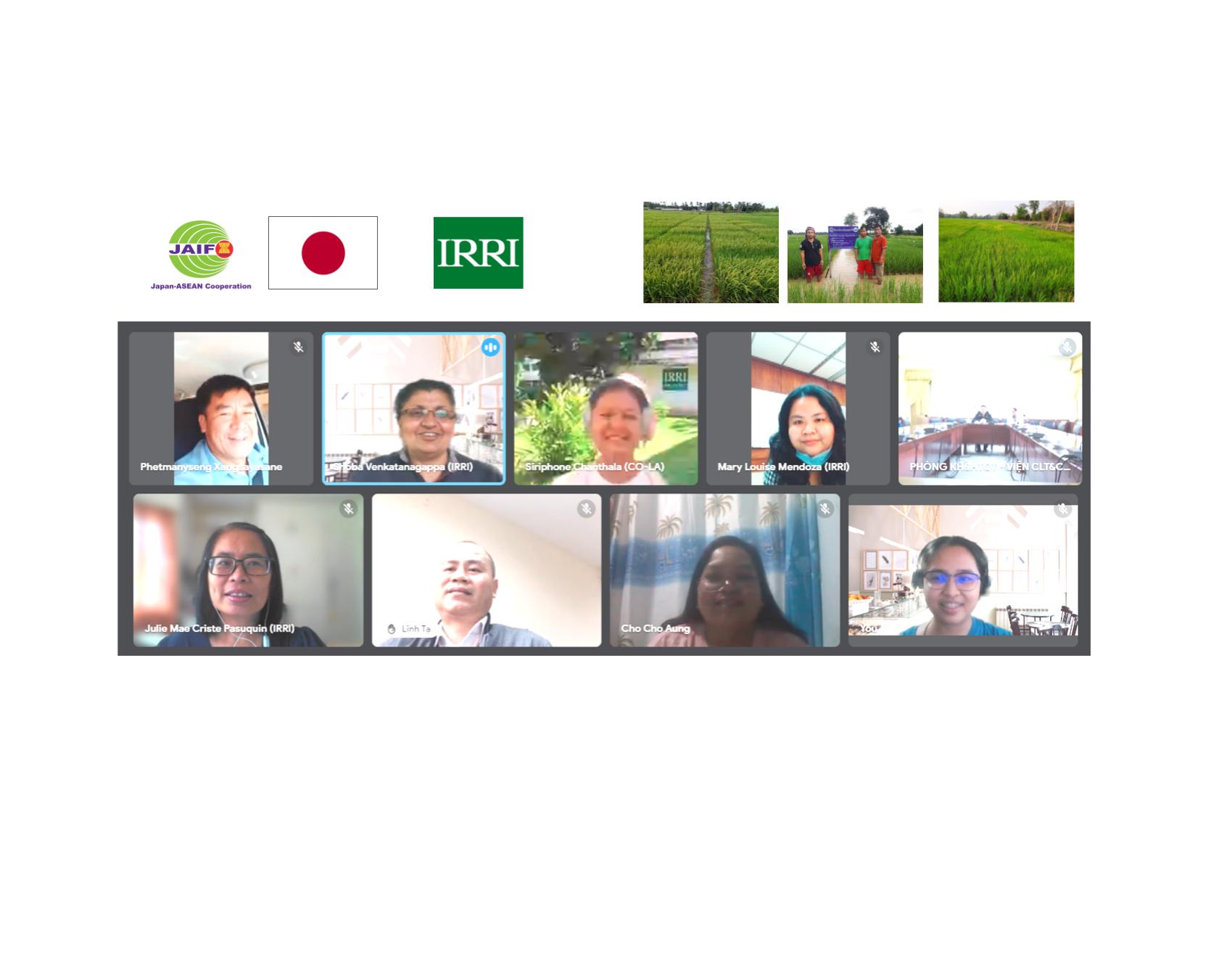JAIF and IRRI collaborate on capacity building for ASEAN Rice Net in 4 SEA countries

10 February 2022 ~ Representatives from the International Rice Research Institute (IRRI) and Southeast Asian countries Cambodia, Lao PDR, Myanmar, and Vietnam, gathered online for their first virtual technical inception meeting of the Japan-ASEAN Integrated Fund (JAIF) Capacity Development Program for ASEAN Rice Net.
Prior to this technical inception meeting, IRRI project management office staff was provided with an administrative briefing by JAIF Management Team Programme Coordinator Ms. Miyuki Ishikawa and Ms. Amalia Agustina from the ASEAN Food, Agriculture, and Forestry Division. The ASEAN Economic Community Department also was part of the briefing session.
The technical inception meeting was hosted by Dr. Shoba Venkatanagappa, IRRI senior scientist and head of the ASEAN Rice Net, INGER, and NARVI networks. Participants of the meeting included Dr. Dao The Anh, Vice-President of Vietnam Academy of Agricultural Sciences (VAAS); Dr. Ta Hong Linh, Director, Department of Science and International Co-operation Vietnam; Dr. Phetmanyseng Xangsayasane, Senior Rice Breeder, Director Rice Research Center, National Agriculture and Forestry Research Institute, Lao PDR; and Dr. Orn Chhourn, Deputy Head of Plant Breeding Division, Cambodian Agricultural Research and Development Institute (CARDI). Breeders from the participating countries and staff from IRRI networks were also present.
Rice is the dominant staple in ASEAN, and its production is facing increasing challenges due to climate change. For every 1 degree Celsius increase in temperature, up to 10% of rice yield can be lost (Peng et al.,2004) and can result in up to 1.3% decline in economic growth (Dell, Jones, and Olken, 2012). Rice production in the ASEAN region is especially vulnerable to more frequent and intense climate effects, including typhoons, floods, droughts, salinity, and extreme temperatures.
In October 2019, the ASEAN and ASEAN Plus Three Partners (China, South Korea, and Japan) endorsed the IRRI proposal “Rice Genetic Solutions for Climate Resilience and Value Addition in ASEAN”, which led to the creation of ASEAN Rice Net, a rice elite germplasm sharing and evaluation network to ensure researchers get access to pre-variety germplasm faster, and farmers region-wide gain improved access to rice varieties that provide better yields, nutrition, and tolerance to biotic and abiotic stresses.
The capacity-building component of ASEAN Rice Net for Cambodia, Lao PDR, Myanmar, and Vietnam was developed by IRRI with funding support from JAIF. The goal of the two-year program is to train a total of 60 rice scientists in ASEAN Rice Net best practices in the four target countries. The training will be facilitated and provided by IRRI, and will adopt a hybrid model of virtual and in-country activities. This includes sharing of pre-variety rice germplasm developed by IRRI breeding programs, advanced pre-variety evaluation technologies, electronic standardized data collection, and precision analysis methods, enabling researchers to conduct data-driven selections in the field that will provide greater accuracy for varietal performance assessments. The program will also give priority opportunities for women scientists, empowering them through skills needed for improved variety selections.
IRRI, ASEAN, and Japan have a 40-year track record of successful collaborations in accelerating rice varieties deployment and the training of thousands of scientists and researchers in rice-based technologies. This capacity, combined with the sharing of improved pre-variety rice lines and rice varieties through the International Network for Genetic Evaluation of Rice (INGER) and Multi Environment Testing (MET) networks, has led to increased rice production in the region, with some countries becoming net exporters.
“IRRI would like to extend our gratitude and appreciation to Japan and to JAIF for their generous and steadfast support of this program,” said Dr. Shoba Venkatanagappa. “Data generated and collected through this program will be shared through ASEAN Rice Net with all participating countries, contributing to region-wide advancement. The program’s outputs can also be used for the deployment of improved rice varieties under various climate change and business development scenarios, helping to improve farmer livelihoods, reduce hunger and malnutrition, enhance export capacity, and support national and regional food self-sufficiency objectives.”
ABOUT JAIF
The Japan-ASEAN Integration Fund (JAIF) was established in 2006 to support the efforts of the Association of Southeast Asian Nations (ASEAN) and the ASEAN Member States (AMS) to pursue a comprehensive integration towards an open, dynamic, and resilient ASEAN Community. JAIF promotes cooperation between Japan and ASEAN, and provides support for the implementation of the ASEAN 2025 Blueprints, as well as the operations of regional and sub-regional organizations.
jaif.asean.org